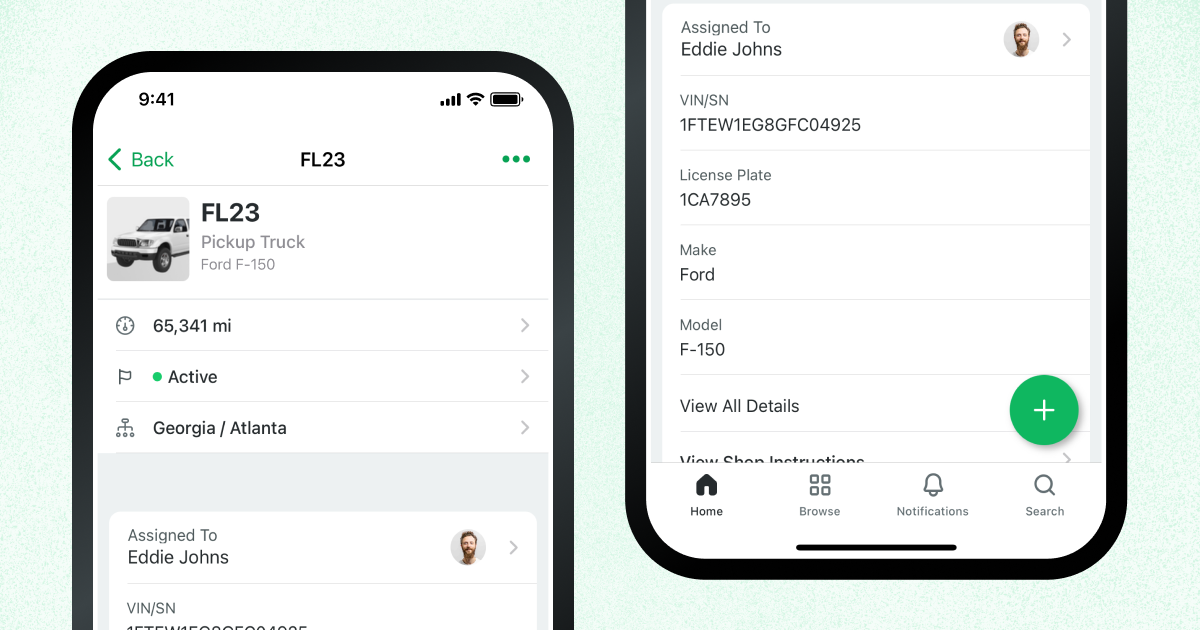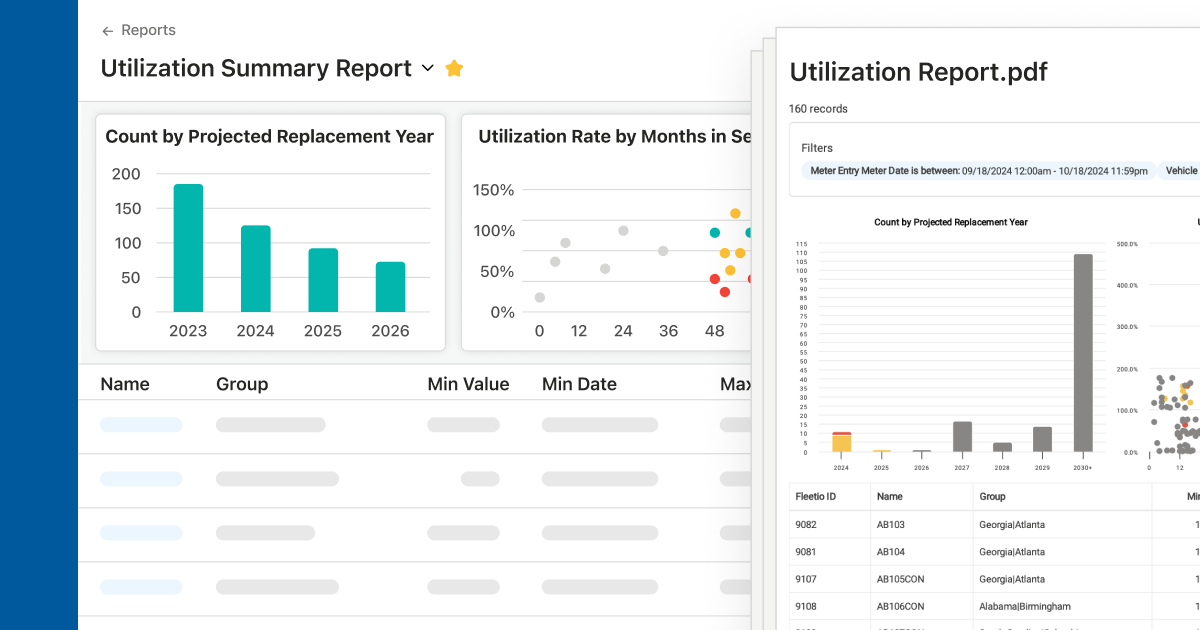Top 10 Features to Look for in Fleet Management Software
You need a better way to manage the moving pieces of your fleet. This guide explores 10 essential features to look for in a fleet management platform, so you can reduce costs, improve uptime and stay ahead.
Mar 15, 2025
11 min read

Content Overview
Discover 10 essential features to look for in a fleet management platform, including mobile access, integration options and cost tracking tools – all to help you run a more efficient, resilient fleet.
You need a way to stay ahead — a system that puts all the moving pieces in one place so you can focus on what really matters: keeping your fleet on the road and your business running smoothly. You don’t have time for inefficiencies, unexpected breakdowns, or outdated processes that slow you down.
That’s where fleet management software comes in.
Many fleet managers rely on fleet management software to improve processes and better manage operations. A fleet management system not only improves maintenance compliance but also assists in decision making for things like vehicle purchasing, balancing asset utilization and work order assignments.
Before choosing a fleet management platform to manage your operations, it’s important to consider which features of a fleet management system you need to achieve success as a fleet manager.
10 features to look for in fleet management software
Top features to look for in fleet management software
There are countless fleet management software providers available to choose from, each taking similar approaches to help you improve your overall impact as a fleet manager.
The best fleet management software centralizes your data, integrates with other solutions, automates workflows and maintains a comprehensive database making life much easier for fleet managers.
Let's break down the essential features of a great fleet management system and help you find the right solution to take control of your operations with confidence.
Ease of use: Support adoption across your entire team
Some fleet managers can be apprehensive when making the switch to an improved fleet management system due to concerns over change, or whether their team will actually make use of the software. Fortunately, a modern fleet management software is built with ease of use in mind.
There might be a small learning curve for some of your team members, but a good system will make the lives easier for everybody on your team.
Fleetio was made for fleet management. The ease, the simplicity, the overall user-friendliness did it for us. Samantha Saysoff, Unified Government of Wyandotte County →
Though most fleet management systems seem easy to use, there are often questions along the way. Find a software that offers training and support on the front end so that you can guarantee a successful rollout.
Simple implementation: Get started quickly, no IT required
One of the benefits of implementing a web-based fleet management solution, like Fleetio, is that you can easily start using the product immediately, as there’s no software to download or on-site implementation. As soon as an account is created, it should be a breeze to start adding your fleet vehicles.
While fleet managers can get started on their own, quality fleet management software provides live support and educational resources, like training videos and webinars, to guide you through implementation. Fleetio also offers Onboarding Services Packages to accelerate the onboarding process and offer feature-based training.
Mobile access: Manage your fleet from anywhere
Your fleet is mobile and your fleet management system should be, too. The use of outdated paper-processes inhibits communication and doesn’t provide a clear look at your fleet in real time. The ability to collaborate through software and mobile apps in real time can transform your fleet efficiencies. A fleet management solution that prioritizes visibility and collaboration allows you to enact the most proactive approach.
A mobile-first fleet management software enables fleet managers to stay connected to drivers, maintenance supervisors, mechanics and their assets with a native mobile app. An app for fleet management enables users to log and upload accurate data instantly, keep the lines of communication open and maintain vehicle uptime.
Scalability: A platform that grows with your operations
All fleets are different and range considerably in size, often growing as the company grows. Whether you have 10 or 10,000 mobile assets, the best fleet management software is scalable and caters to your fleet’s specific needs.
Scalable fleet management software should allow you to perform actions in bulk and surfaces vehicle-level insights automatically. Some also have a simple pricing model so that any future expenses are predictable.
Integration options: Connect your fleet tech stack
Many fleets, even ones not currently using fleet management system, currently use some form of technology to streamline processes. Tools like telematics devices (e.g., Geotab, Samsara) and fuel cards (e.g., WEX, Fuelman) aid fleet management and offer large amounts of data to track and analyze.
Manage your fleet, your way—all in one place.
Centralize data, identify operational trends, track asset utilization, get real-time insights, and so much more.
Start a free trialWhile these tools are useful on their own, combining them into one system improves the value by allowing you to track all fleet data in one place. Fleetio not only integrates with many of the top telematics devices and fuel cards but also provides a built-in Maintenance Shop Network, allowing you to track third-party service alongside your existing service records.
Fleet reporting: Unlock insights to drive decisions
The success of your fleet is all in the numbers. Having hard data on every aspect of your fleet helps you make the best decisions for maintenance and operations.
While spreadsheets may have the data, they can be difficult to surface, read and analyze quickly. Instead of tracking down the right information to send to stakeholders, fleet management software provides robust fleet reports for you to analyze and improve your fleet.
In addition to having easy-to-read data at your fingertips, a fleet management system allows for flexible, configurable reporting for you to get the most out of your data. You can also subscribe to reports you need regularly, or export them to PDFs to share with other stakeholders.
Expense management: Uncover your total cost of ownership (TCO)
A fleet manager can spend hours, days, even months crunching numbers to try and determine their fleet’s total cost of ownership (TCO). What if this was automatically calculated?
To get a true look at your TCO and vehicle cost per mile, a fleet management system offers comprehensive expense reporting that provides a detailed look at your operating costs. Not only does this allow you to gain insight into expenses like fuel and maintenance, but it also helps identify overspending and enables budget tracking.
From there, you can analyze trends and make informed decisions to improve expense management. This data can also be easily applied to help determine your optimal vehicle replacement window.
Performance metrics: Spot trends to improve efficiency
The past can teach us a great deal about the future. Tracking the history of your fleet’s performance helps identify patterns and trends across your assets that will help improve your fleet’s future.
We never had any way to calculate vehicle downtime, or even return on investment, or overall cost of doing business. There was never a way to capture that prior to Fleetio. Tom Rowlings, City of Cambridge →
The best way to track performance across your fleet is by measuring real-time performance metrics like asset utilization, service history and fuel trends to discover areas of improvement and determine the best course of action for the future of your fleet.
Automated workflows: Save time by reducing manual tasks
With the busy schedule of fleet managers, it’s hard to find time to key in data, much less analyze it. One of the top benefits of fleet management software is the ability to automate processes and data collection.
An automated fleet management system automates everyday operations, like inspections and preventive maintenance, to streamline fleet management and collects virtually all fleet data in real-time, eliminating manual data entry and organizing all data in an easy-to-search platform.
Instead of trying to track down information across multiple spreadsheets, you can spend more time analyzing it.
Return on investment: Maximize value and minimize costs
Your fleet doesn't have to be a cost center. A good fleet management system is more than a tool that improves the efficiency (and lives) of all who use it, it's also a tool for identifying cost-savings opportunities in your fleet.
A few ways that fleet management software can save you money:
- Improve the uptime of your fleet, so that you aren't losing money with sidelined vehicles
- Avoid costly vehicle breakdowns by adhering to strict maintenance schedules
- Compare the fuel economy of vehicles to see if any are under-performing
- Know when to part ways with a costly vehicle by measuring the cost of operating over time
- Surface signs of fuel theft to cut down on concerning spend
The best fleet management software easily demonstrates the value and ability to maximize your fleet’s ROI. Learn how Fleetio helps maximize fleet return on investment with built-in cost analysis tools.
Compare Fleetio to other fleet software platforms
Not all fleet management systems are created equal. When it comes to fleet management software, necessary features should be configurable to fit your fleet’s needs.
You may come across several providers offering a similar solution, but the capabilities might contrast greatly. This stresses the importance of kicking the tires with a trial period or a guided demo of the software before committing.
Here are a few of the features in Fleetio that help us stand out among the competition:
| Feature | Fleetio | Other Platforms |
|---|---|---|
| Mobile app with real-time updates | ✅ | ⚠️ Often limited or third-party |
| Unlimited users and roles | ✅ | ⚠️ Per-user pricing common |
| Preventive maintenance reminders | ✅ | ✅ |
| Parts & inventory tracking | ✅ | ❌ Often unavailable or separate |
| Integration with fuel cards & telematics | ✅ | ⚠️ Manual imports or limited partners |
| Custom, shareable reports | ✅ | ⚠️ Export-only or no visuals |
| Onboarding & live support | ✅ | ⚠️ Add-on or limited |
Looking for a better fit? These are just a few of the ways Fleetio delivers more value for modern fleets. Explore all features →
What Fleetio users love the most
It would take at least seven more blog posts (and who has time for that?) to cover all of the ways that we can help your fleet, but these are some of the features that get the most praise from Fleetio users:
- Driver Assignments: Track who’s using each asset to improve accountability and asset utilization
- Tool & Equipment Tracking: Monitor tool usage and link equipment to assets for full operational visibility
- Digital Inspections with Alerts: Surface safety and maintenance issues with auto-notifications from the field
- Parts Inventory & Tire Management: Get alerts before stockouts delay maintenance
- Unlimited Users: Promote collaboration across roles without added licensing fees
- Success Resources: Access onboarding services and an always-on customer success team
- Maintenance Shop Network: Integrate third-party shops alongside in-house service
Experience the Fleetio difference
Fleetio finds the data in your everyday operations and turns it into powerful insights, so you can drive your fleet forward with confidence.
Get a walkthroughFleet Management Software FAQs
What does fleet management software do?
Fleet management software helps organizations track and improve their fleet operations. It equips fleet managers with tools to oversee vehicles, monitor maintenance, track fuel consumption, enhance driver safety and ensure compliance with regulations. By automating processes and consolidating data in software, fleet managers can make informed decisions that reduce costs and boost efficiency.
What are the key functionalities provided by the fleet management information system?
A Fleet Management Information System (FMIS) optimizes operations and improves fleet performance. It provides live asset monitoring, scheduling for maintenance to reduce downtime, and fuel management features to track usage and expenses. It also facilitates driver safety assessments and delivers thorough reports to enhance operations and cut costs.
What are the functions of fleet management?
Fleet managers are responsible for minimizing breakdowns in their fleet. They do this by purchasing the right vehicles, focusing on maintenance, and setting up systems to constantly monitor the status of their fleet. Fleet managers also focus on cost control and leveraging technology to enhance efficiency.
What are the elements of fleet management?
Successful fleet management is about creating processes and acquiring the resources needed to stay efficient and compliant. The best fleet managers have a mindset of constant improvement, leveraging technology and data to move their fleet forward.

Content Marketing Specialist
Laura Flowers is the Content Marketing Specialist at Fleetio. When she’s not blogging, you can find her reading on the couch with her cat or in the studio tap dancing.
LinkedIn
Director of Fleet Content, Fleetio
Zach Searcy is the Senior Content Marketing Manager at Fleetio with more than 5 years of experience in the automotive and fleet industries. His content creation days started in middle school when he and his friends began filming lightsaber battles to upload to a new website: 'YouTube.'
LinkedIn|View articles by Zach SearcyReady to get started?
Join thousands of satisfied customers using Fleetio
Questions? Call us at 1-800-975-5304



